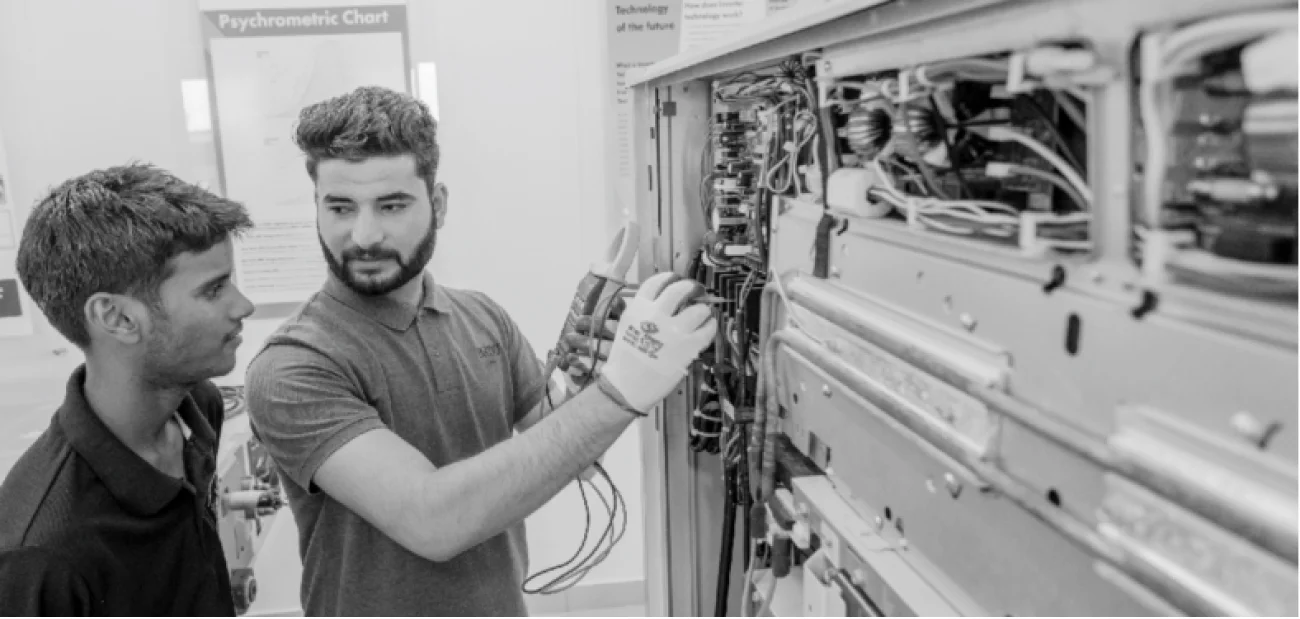Growth in the HVAC field
The HVAC (Heating, Ventilation and Air Conditioning) industry is witnessing remarkable growth, fuelled by the rising demand for energy-efficient solutions and advancements in smart technology. With the global focus on sustainability, HVAC systems are evolving to meet new environmental standards, incorporating innovations like smart thermostats, IoT integration, and automation to optimize energy consumption. The shift toward green building practices, coupled with the need for improved indoor air quality, has heightened the importance of HVAC systems in residential, commercial, and industrial sectors. Urbanization and expanding infrastructure projects, particularly in developing countries, are further accelerating the industry’s expansion.
This growth opens new avenues for skilled professionals, especially in the design, installation, and maintenance of sophisticated HVAC systems. As climate change continues to influence global policies, the industry is expected to play a pivotal role in reducing carbon footprints, making HVAC a critical component of future-ready infrastructure. The continued development of smart, efficient HVAC technologies positions the industry for sustained growth and innovation.
The global HVAC (Heating, Ventilation, and Air Conditioning) market is indeed expected to experience substantial growth, with its value projected to increase from USD 281.7 billion in 2024 to USD 389.9 billion by 2029, reflecting a compound annual growth rate (CAGR) of 6.7%.
Several key factors are driving this growth:
- Demand for Energy-Efficient Solutions:
Energy-efficient and sustainable buildings are becoming a priority across residential, commercial, and industrial sectors. HVAC systems play a crucial role in reducing energy consumption, making them integral to sustainable construction. - Climate Change:
The growing need for climate control systems, both heating and cooling, is increasingly urgent as weather patterns become more extreme. - Smart HVAC Technology:
Intelligent systems equipped with sensors and real-time monitoring are driving market innovation, offering analytics for energy savings and improved climate control. These advancements are particularly appealing as they allow users to optimize energy use, aligning with sustainability trends.
In the evolving job market, there is a growing demand for skilled HVAC technicians as nearly 90% of employment opportunities require vocational skills. Graduates from FRACS are expected to undertake a variety of tasks, from the installation and maintenance of HVAC systems in homes, offices, and industrial settings to diagnosing, repairing, and optimizing energy-efficient refrigeration and air conditioning systems. They are also trained to handle tasks related to smart cooling technologies and sustainable solutions. This comprehensive training prepares students for a wide range of job roles. FRACS ensures that its students are well-prepared by offering theoretical instruction, state-of-the-art practical training, and real-world industry experience through internships, enabling them to meet the high demands of the refrigeration and air conditioning market.
Infrastructure and Equipment
The Faculty of Refrigeration and Air Conditioning Skills (FRACS) at Bhartiya Skill Development University (BSDU), Jaipur, has been established with the goal of delivering high-quality education coupled with extensive hands-on training in both labs and industry settings. FRACS is equipped with advanced laboratories, a comprehensive library, and a faculty of experienced trainers to fulfil its mission. FRACSE provides skill-focused training in installation, commissioning, testing, and maintenance of HVAC systems in residential, commercial, and industrial sectors. According to industry experts, HVAC skills are highly sought after, making FRACS an ideal choice for students aspiring to excel in this field. Graduates have excellent prospects for employment in government and private sectors or even as entrepreneurs. Furthermore, students have opportunities for scientific research and technological innovation. FRACS students also benefit from prestigious internships in national and international HVAC industries, such as Daikin, Voltas, Blue Star, and Carrier.
The Faculty of Refrigeration and Air Conditioning emphasizes both theoretical knowledge and practical training. By offering access to qualified faculty, cutting-edge equipment, and a strong focus on On-the-Job Training (OJT), FRACS ensures students work independently on industry-standard machines, building confidence and expertise. In Faculty, there are many well equipped like VRV Lab, Air Distribution Lab, Domestic Refrigeration and Air Conditioning Lab. With a focus on the Swiss Dual System of Training, students gain in-depth knowledge through hands-on experiences and guidance from specialized trainers. FRACS also encourages the holistic development of its students, providing opportunities in extracurricular activities to ensure they not only become proficient professionals but also lead fulfilling lives. The Faculty of Refrigeration and Air Conditioning Skills has equipped with the current industry needs machines and lab including:
The Variable Refrigerant Volume (VRV) Lab specializes in advanced HVAC technology, allowing precise control over refrigerant flow. It enables energy-efficient cooling and heating, providing hands-on experience with modern, scalable HVAC and Central Air Conditioning systems.
The Air Distribution Lab focuses on teaching the principles and techniques of distributing air efficiently in HVAC systems. It provides hands-on training with various ducts, diffusers, and ventilation systems, emphasizing airflow dynamics, pressure control, and system balancing. This lab helps students master optimizing indoor air quality and thermal comfort.
The Electrical Single and Three Phase Lab offers practical training in handling both single-phase and three-phase electrical systems, essential for HVAC operations. Students learn about power distribution, wiring, circuit protection, and troubleshooting techniques. The lab is equipped with modern tools and equipment, enabling hands-on experience in installation, testing, and maintenance of electrical systems for HVAC applications.
Future prospectus for student’s opting for HVAC as a career.
- HVAC Technician
- Service Engineer
- Project Manager (HVAC Installation)
- System Designer (Refrigeration and AC Systems)
- Energy Auditor (HVAC Systems)
- Cold Storage Manager
- Maintenance Engineer
- Refrigeration Specialist (Industrial and Commercial Systems)
- Technical Sales Engineer
- Entrepreneur (HVAC Services or Consultancy)
- Field Service Technician
- Transport Refrigeration Engineer
- Facility Manager (Air Conditioning and Refrigeration Systems)
- Trainer or Instructor (Vocational Skills in RAC)
- R&D Technician (Refrigeration Technology)

